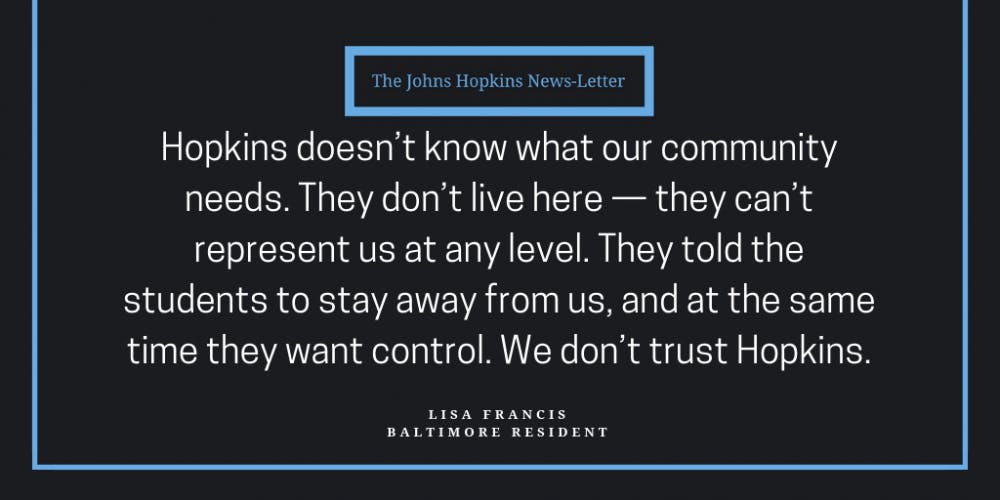At the second and final open forum in the University’s Public Safety Initiatives series, Hopkins officials revealed new details about their proposed private police force. Community members, however, voiced their opposition to the University’s plans and criticized Hopkins for failing to acknowledge their concerns.
The event took place in the Weinberg Community Center on Monday, Nov. 26 and featured a panel including University President Ronald J. Daniels, Vice President for Security Melissa Hyatt and Senior Vice President of Hopkins Medicine Robert Kasdin. Jeanne Hitchcock, special advisor to the vice president for local government, community and corporate affairs, moderated the discussion.
Daniels justified the necessity of the proposed police force by highlighting the prevalence of gun violence and homicide in Baltimore.
“Quite simply, the situation of violent crime for our city and for the communities, of which we are a part, is serious. It is unrelenting and it is, from my perspective, unsustainable,” he said. “These incidents can’t help but affect the communities we are a part of and affect life on our campuses. Neither Hopkins nor the city can accept the level of crime that has become the norm.”
Daniels stated that the proposed police force would consist of 100 armed officers, with 25 stationed across the Medical, Peabody and Homewood campuses at any given time. The amended House Bill 1803, which would allow the University to create a private police force, specified that the officers would be authorized by law to make arrests on campus as well as on public property adjacent to the campuses.
Donald Gresham, a member of the East Baltimore community and president of the Baltimore Redevelopment Action Coalition for Empowerment (BRACE), stated that the Public Safety Initiatives events do not provide a realistic opportunity for participants to voice their concerns. Instead, he thinks they serve to benefit the University’s reputation, so that when it resubmits the bill, the administration can point to community forums as examples of sufficient outreach. He condemned the University’s lack of consideration for potential community impact.
“We keep having these meetings so that it can appear to the delegates that you did your homework. However, there’s no response to the negative side,” Gresham said. “They’re just going to go back to Annapolis and say we had these meetings with the community.”
Gresham noted that the previous discussion panel, which took place on the East Baltimore campus in the early afternoon, was inaccessible to community members who work. He explained that other events were not well-attended because they were poorly advertised.
This contradicted Hitchcock’s opening remarks during the forum. She claimed that Hopkins has done extensive outreach to try to better understand the opinions of community members.
“My team, the government and relations team has gone to dozens and dozens of community organizations’ meetings. We’ve met with dozens of neighborhood leaders, and we’re not through yet. You invite us, we come,” she said.
In addition, Hyatt highlighted the benefits of sworn officers, such as their ability to wear body cameras. She stated that the officers’ training would be disclosed to the public, claiming that the selectively recruited officers would also be tested on emotional intelligence, de-escalation tactics, crisis intervention, mental health response, sexual assault response and implicit bias.
Hyatt is considering including specially trained mental health professionals as first responders.
Baltimore resident Lisa Francis remarked that the University’s police force should not have the ability to patrol surrounding areas, due to the community’s distrust of Hopkins.
“Hopkins doesn’t know what our community needs. They don’t live here — they can’t represent us at any level. They told the students to stay away from us, and at the same time they want control. We don’t trust Hopkins,” she said. “We lived in this community very happily and, at this point, our lives became a very unhappy community.”
Because of feedback from the last event, the administration decided to shorten the speakers’ introductions to allow for more time for input from forum attendees. It also decided to combine the events targeted at community members with events targeted at students, because many community members and students share similar concerns.
At the conclusion of the forums and discussion series, revised legislation will be drafted. Following this, the community and students will have a 30-day period to comment and ask for clarification on the writing.





